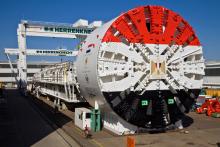German Minister of Economy and Energy, Sigmar Gabriel, attended the signing of a prized contract for the delivery of two Herrenknecht tunnel boring machines (TBM) for a large multi-functional tunnel in the Chinese city of Wuhan.
German Minister of Economy and Energy, Sigmar Gabriel, attended the signing of a prized contract for the delivery of two 2592 Herrenknecht tunnel boring machines (TBM) for a large multi-functional tunnel in the Chinese city of Wuhan.
The German firm’s key contract with5250 Shanghai Tunnel Engineering Co (STEC) was signed in Kunshan, Jiangsu Province on 23 April 2014 and will see Herrenknecht TBM’s play a vital role in extending Wuhan’s Metro network from three to seven lines, from 73km to 215km, by 2017. The megaproject in Wuhan, which has a population of 10 million, will enhance the city’s status as the most important transport hub in central China.
The two Mixshields with an excavation diameter of 15.76m being supplied to STEC by Herrenknecht will Cross under the Yangtze River in Wuhan and create a twin-bore double-decker tunnel. A three-lane road will run on the upper deck, with Metro line 7 below. The 2,590m long tunnel alignment runs up to 39.5m below the water surface in complex soil. On the one hand, a high water pressure of 5.3bar must be dealt with. In addition, the tunnel runs through varying geological formations, partly completely sand and clay, partly a mixed geology with mudstone, conglomerates and sand.
With its size and multi-purpose use, the Wuhan multi-functional tunnel construction is said to be a flagship project for mechanised tunnelling worldwide.
Shanghai Tunnel Engineering Co (STEC) has previously used Herrenknecht equipment on a number of other large-scale tunnelling projects in China, usually months ahead of schedule. These include several large-diameter road tunnels in Hangzhou and Shanghai.
The German firm’s key contract with
The two Mixshields with an excavation diameter of 15.76m being supplied to STEC by Herrenknecht will Cross under the Yangtze River in Wuhan and create a twin-bore double-decker tunnel. A three-lane road will run on the upper deck, with Metro line 7 below. The 2,590m long tunnel alignment runs up to 39.5m below the water surface in complex soil. On the one hand, a high water pressure of 5.3bar must be dealt with. In addition, the tunnel runs through varying geological formations, partly completely sand and clay, partly a mixed geology with mudstone, conglomerates and sand.
With its size and multi-purpose use, the Wuhan multi-functional tunnel construction is said to be a flagship project for mechanised tunnelling worldwide.
Shanghai Tunnel Engineering Co (STEC) has previously used Herrenknecht equipment on a number of other large-scale tunnelling projects in China, usually months ahead of schedule. These include several large-diameter road tunnels in Hangzhou and Shanghai.







